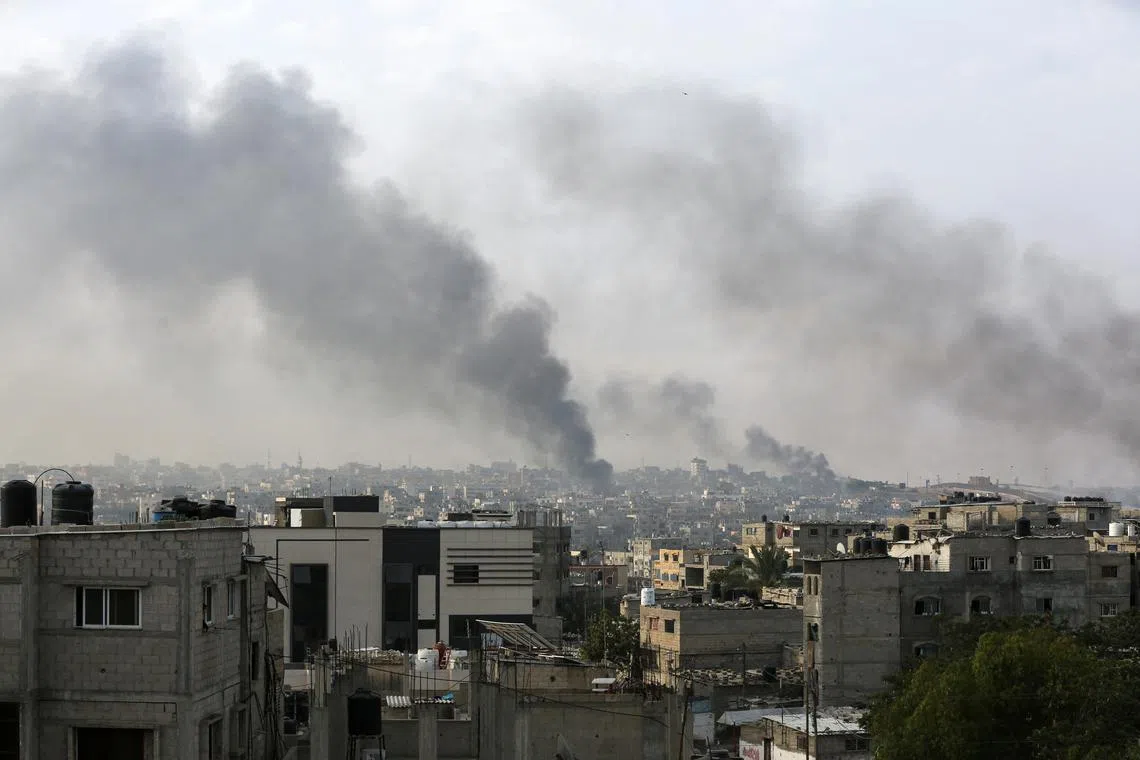21 killed as Israeli tanks hit another evacuation zone west of Rafah
Sign up now: Get ST's newsletters delivered to your inbox

Smoke rises following Israeli air strikes in Rafah, in the southern Gaza Strip, on May 28.
PHOTO: REUTERS
CAIRO – Israeli tank fire on a tent camp in an evacuation area west of the southern Gaza city of Rafah killed at least 21 people on May 28, two days after an air strike on another camp stirred global condemnation.
Gaza emergency services said four tank shells hit a cluster of tents in Al-Mawasi, a coastal area that Israel has advised civilians in Rafah to move to for safety.
At least 12 of the dead were women.
An Israeli military spokesman said: “As of this time, we are not aware of this incident.”
In central Rafah, tanks and armoured vehicles mounted with machine guns were spotted near the Al-Awda mosque. The Israeli military said its forces continued to operate in the city, without commenting on reported advances into the city centre.
International unease over Israel’s three-week-old Rafah offensive has turned into outrage after an attack on May 26 set off a blaze in a tent camp
Israel said it targeted Hamas commanders and had not intended to cause civilian casualties.
Global leaders voiced horror at the fire in what was supposed to be a designated “humanitarian zone” of Rafah, where families uprooted by fighting elsewhere had sought shelter, and urged the implementation of a World Court order last week for a halt to Israel’s assault.
The Israeli military said it is investigating the possibility that munitions stored near a compound in Gaza that was hit by an air strike may have caught fire, causing the deadly blaze.
Rear-Admiral Daniel Hagari, the military’s chief spokesman, said it was still unclear what set off the fire, but he insisted that the 17kg munitions used in the strike are believed to be too small to have set off such a big conflagration.
“We are looking into all possibilities, including the option that weapons stored in a compound next to our target which we did not know of may have ignited as a result of the strike,” he said during a televised briefing, adding that footage of the incident indicated there were secondary explosions following the strike.
In a diplomatic move purportedly aimed at reining in the violence, Spain, Ireland and Norway officially recognised a Palestinian state
These three countries have said they hope their decision will accelerate efforts towards securing a ceasefire in Israel’s war against Hamas militants, now in its eighth month, that has reduced much of the densely populated territory to rubble.
Residents said Rafah’s Tel Al-Sultan neighbourhood, the scene of the May 26 night-time strike in which tents and shelters were set ablaze as families settled down to sleep, was still being bombarded.
“Tank shells are falling everywhere in Tel Al-Sultan. Many families have fled their houses in western Rafah under fire throughout the night,” one resident told Reuters via a chat app.
Around a million people have fled the Israeli offensive in Rafah since early May, the UN agency for Palestinian refugees reported on May 28.
A video obtained by Reuters showed families on the move again, carrying their belongings through Rafah’s shattered streets, their weary children trailing behind them.
“There are a lot of attacks, smoke and dust. It is death from God... The (Israelis) are hitting everywhere. We’re tired,” said Mr Moayad Fusaifas, pushing along belongings on two bicycles.
Remote-controlled armoured vehicles
Since Israel launched its incursion by seizing control of the Rafah border crossing with Egypt three weeks ago, tanks had been probing around the outskirts and entered some eastern districts but had not yet rumbled into the city in full force.
In recent days, Israeli tanks have thrust towards western neighbourhoods and taken up positions on the Zurub hilltop in western Rafah.
On May 28, witnesses reported gun battles between Israeli troops and Hamas-led fighters in the Zurub area.
Witnesses in central Rafah said the Israeli military appeared to have brought in remote-operated armoured vehicles, and there was no immediate sign of personnel in or around them. An Israeli military spokesperson had no immediate comment.
The Israeli military said it operated overnight along the Philadelphi Corridor that separates Gaza from Egypt “based on intelligence indicating the presence of terror targets”.
Israeli troops were engaged in close-quarter combat and were locating tunnel shafts, weapons and militant infrastructure, it said in a statement.
Israel has kept up attacks despite a ruling by the International Court of Justice (ICJ) on May 24 ordering it to stop,
Israel has argued that the top UN court’s decision grants it some scope for military action there.
The ICJ also reiterated calls for the immediate and unconditional release of hostages held in Gaza by Hamas.
More than 36,000 Palestinians have been killed in Israel’s offensive.
Israel launched the operation after Hamas-led militants attacked southern Israeli communities on Oct 7, killing around 1,200 people and seizing more than 250 hostages.
Israel says it wants to root out Hamas fighters holed up in Rafah and rescue hostages it says are being held in the area.
In Jabalia, in northern Gaza, one of the largest of the enclave’s eight historic refugee camps, Israeli forces have been engaged in fierce fighting with Hamas and Islamic Jihad fighters.
On May 28, medics said an Israeli air strike killed and wounded several Palestinians in a house in the Falouja neighbourhood. Civil emergency teams said they believed many bodies were under the rubble of buildings, where they cannot be reached. REUTERS


